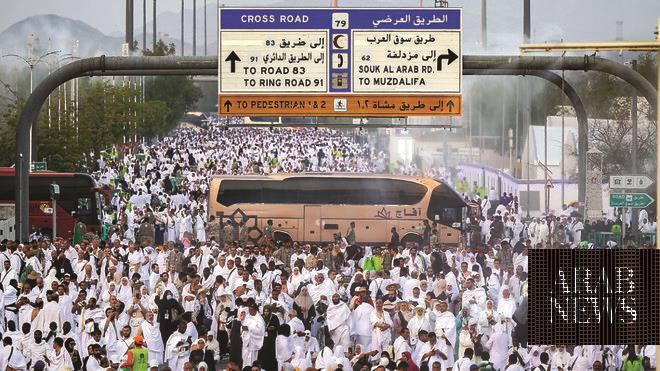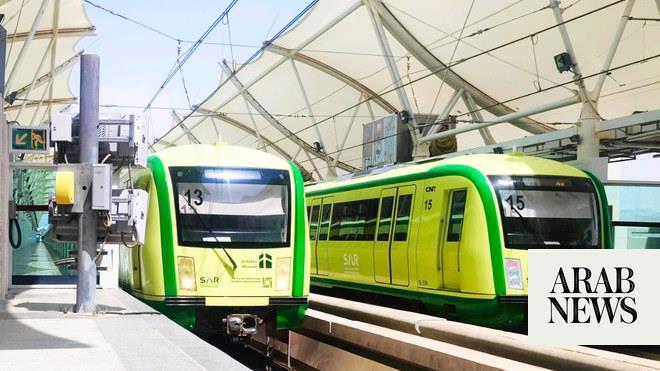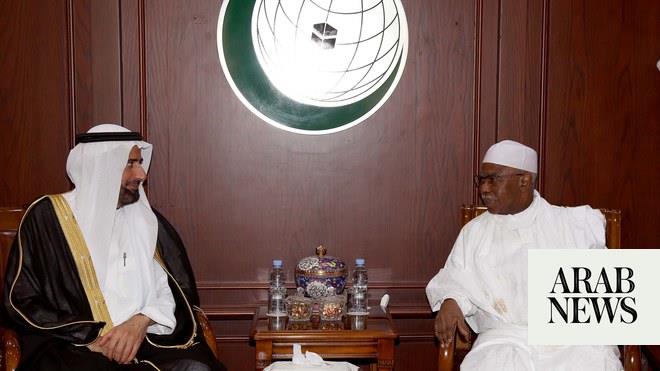
ARAFAT: Pilgrims have remained inventive in their quest for comfort, despite Saudi Arabia’s diligent efforts to mitigate the sweltering heat at the holy sites.
Alongside the Kingdom’s measures — which include extensive cooling systems — pilgrims are using rechargeable and battery-powered neck and handheld fans in their determination to offset the challenging conditions brought by the summer.
A sprinkler system comprising more than 8,000 water posts has been installed at the holy sites to mitigate the high temperatures. (SPA)
The portable fans provide much-needed relief by offering personal cooling in crowded areas where air circulation may be limited. They allow pilgrims to maintain comfort and focus on their religious duties without being overly affected by the extreme temperatures, thereby enhancing their overall pilgrimage experience.
According to online retail websites, the hands-free fans range from $4 to $8, while neck fans are between $32 to $60. However, some portable waist clip fans may cost from $30 to more than $110. NUM BER 230k
Managed by the Royal Commission for Makkah City and Holy Sites, the sprinkler system at the holy sites disperses 230,000 cubic meters of water through a pipe network spanning over 190,000 meters.
In accordance with the Health Ministry’s warnings and instructions, many pilgrims are also being observed using small water sprinklers to cool themselves amid the high temperatures.
A sprinkler system comprising more than 8,000 water posts has been installed at the holy sites to mitigate the high temperatures. (SPA)
A report by the National Center for Meteorology noted that temperatures reached 46 C in Arafat on Saturday. In anticipation of such conditions, a massive water sprinkler system had been installed to reduce heat and refresh the air for pilgrims.
Saleh Al-Sufiyani, a Saudi pilgrim from Taif, said that he was aware of the weather conditions in Makkah and purchased a cooling gadget for SR150 (approximately $40).
Pilgrims are using rechargeable and battery-powered neck and handheld fans in their determination to offset the challenging conditions brought by the summer. (SPA)
He added: “The device provides direct airflow to my neck and face, which are sensitive areas for cooling the body. It helps me feel more comfortable as it reduces the sensation of heat.”
Maryam Jadallah, an Egyptian pilgrim, said that she had bought her portable battery-powered fan from Jeddah after learning about the high temperatures in Makkah.
Water is sprayed on Muslim pilgrims at the rocky hill known as the Mountain of Mercy, on the Plain of Arafat, during the annual Hajj pilgrimage, near the holy city of Mecca, Saudi Arabi, Saturday, June 15, 2024. (AP)
She added: “The fan operates quietly, allowing me to hear everything around me without disturbing my supplications.”
She stressed that cooling the body during hot weather can help prevent heat-related illnesses like heat exhaustion or heatstroke.
Volunteers spray water on Muslim pilgrims during the annual Hajj pilgrimage. (AN photo by Huda Bashattah)
She said that despite having her fan with her, she often kept it off as fans and water sprinklers were installed everywhere to help the pilgrims stay cool.
According to Kidana Development Company, a substantial sprinkler system comprising more than 8,000 water posts has been installed at the holy sites to mitigate the high temperatures.
Despite Saudi Arabias diligent efforts to mitigate the sweltering heat in the holy sites, pilgrims remained inventive in their quest for comfort. (AN photo by Huda Bashattah)
Managed by the Royal Commission for Makkah City and Holy Sites, the system disperses 230,000 cubic meters of water through a pipe network spanning over 190,000 meters. It will operate for 15 hours daily across a span of 13 days.
A recent study published by King Faisal Specialist Hospital and Research Centre revealed that heat-related deaths and strokes during Hajj have fallen by 47.6 and 74.6 percent respectively over a 40-year period because of the interventions by the Kingdom’s government.











